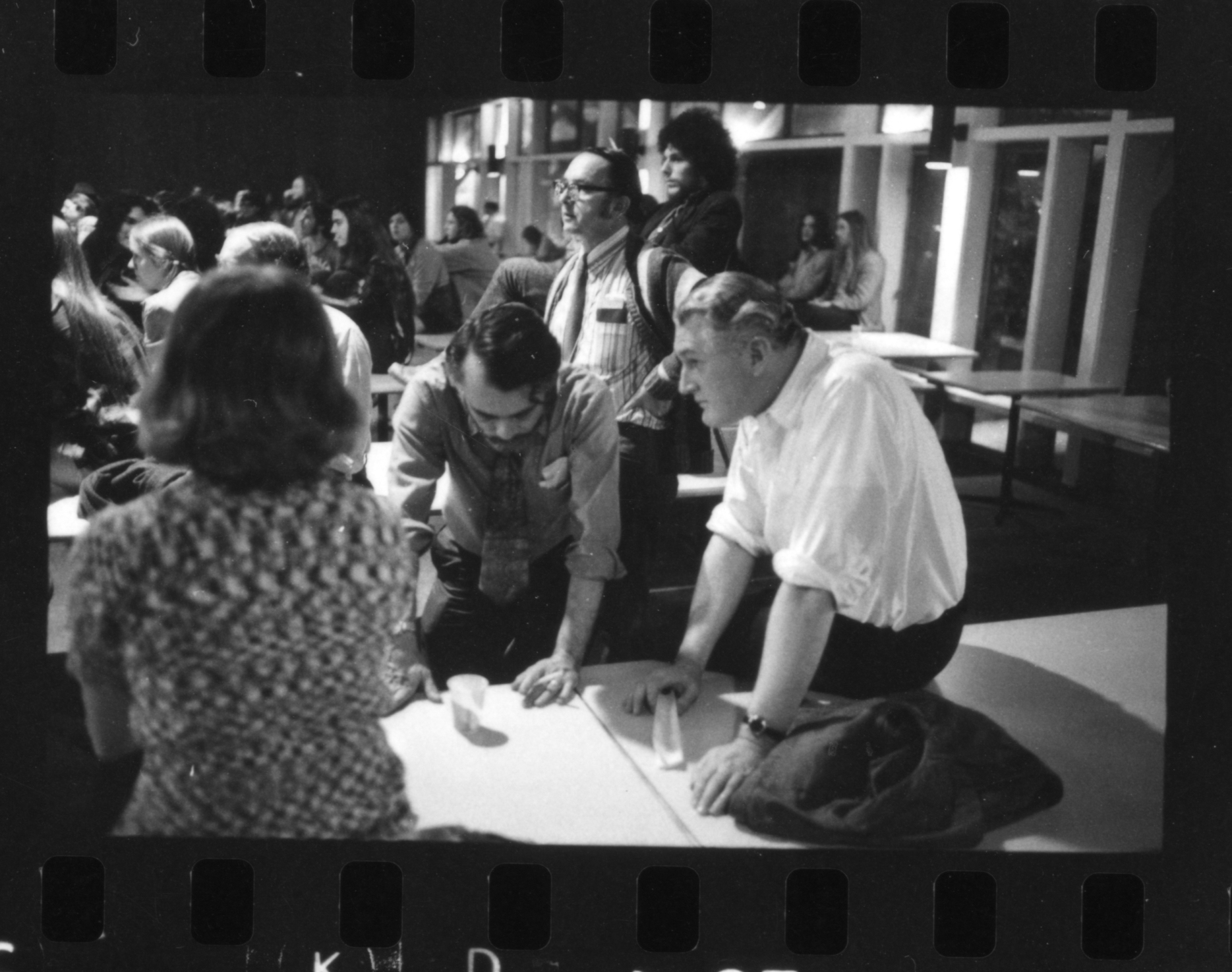
IRIS login | Reed College home Volume 96, No. 2: June 2017
Theatre-lit Major Stages Spring Crisis

UP IN ARMS: Ashlin Hatch ’17 explores Reed culture and traditions in her devised theatre-lit thesis production, which opens March 2.
As every Reedie knows, spring on campus is the season of junior quals, sunshine deprivation, and the inevitable eruption of some campus controversy known as the “spring crisis.” In an original new play opening this Thursday, theater-lit major and former student body president Ashlin Hatch ’17 explores the spring crisis phenomenon in her production This Must Be the Place.
This Must Be the Place is a devised play that examines Reed traditions, stories, culture, and what happened on campus in the spring of 1972 after Nixon had sent B-52s to bomb Hanoi and Haiphong in his controversial escalation of the Vietnam war. That spring, waves of protest spread throughout the country: demonstrators were arrested at Stanford and the University of Michigan, tear gas and batons used against demonstrators at the University of Texas, and 800 Guardsmen were sent to meet demonstrators at the University of Maryland. Reed students were outraged and wanted to take action.

President Paul Bragdon and Provost Marvin Levich [philosophy 1953–94] confer at a meeting in Commons during the student takeover of Eliot Hall in 1972
What happened next is the stuff of Reed legend.
Ashlin Hatch started thinking about all this last fall when, under her watch as Student Body President, a campus crisis seemed imminent. An international student from Lewis & Clark College was reported to Reed CSOs for alleged unwanted sexual touching at an SU Dance. When he became confrontational while the CSOs were escorting him off campus, Portland Police were called and the young man was tazed and arrested. The Reed community expressed a variety of strong opinions about the event. Ashlin says she felt at the time that such crises were not incidental at Reed. As she watched the community and administration respond to the event, she noticed that the campus reaction always played out in a similar way. She wondered whether these habituated responses were limiting the community’s ability to have productive conversations. “Why do we do it this way?” she wondered.
She had been working with Professor Elliot Leffler [theater 2014—], and he encouraged her to keep asking such questions and to think about these community tensions in terms of art. “Is there a show to be made about this?” they discussed.

Ashlin Hatch ’17 (bottom left) with the cast of This Must Be the Place.
“There was an idea in the back of my head about the relationship between Reed community governance and collaborative theatre making. I’d seen so many of the same tensions, so many of the same areas of caring, and so much of the same passion in those two areas of campus. They felt so compatible,” Ashlin says.
As she began to work on her thesis proposal, she scoured old copies of the Student Body Handbook that were stored in the student body executive office until she came upon the story of the spring crisis of ’72 in a section titled “Anti-History.” Four-hundred students, incensed by Nixon’s actions, had gathered in Commons to discuss what they should do about it. A faction decided on and executed a takeover of Eliot Hall. They reportedly called the local news media and also attempted to lock people out of the psychology labs, relenting on the lockout only when threatened should anything happen to the psych department’s population of rats. Later a group went to the state capitol and demanded to see Governor Tom McCall. To Ashlin this spring crisis seemed like a good subject for exploring her ideas because it was remote in time, so lingering tensions might not be a concern. Further, she says, “The way it’s told is abstracted enough that it read to me as this thing that could have happened yesterday and could happen tomorrow.” As she researched further and conducted interviews with alumni, she found a number of surprising parallels. “It was really quite eerily similar to what’s going on on campus right now, and in the world right now.” She adds, “the things that students were arguing about, and were passionate about, and that faculty and administration and everyone on campus were trying to sort out and communicate with each other about, I think are incredibly resonant today.”
Ashlin and her crew set to work devising the show. Devising is a process of theatre making in which there is no script before the cast and crew get together, and all are involved in the creating process. “Everyone is invited to bring ideas to the table and help mold the content of the piece,” Ashlin explains. Hierarchies are dismantled and a combination of improvisation, creative exercises, and other collaborative tools are used to build the work. An Opportunity Grant last year gave Ashlin the chance to study devised theatre at the Under the Radar festival, which showcases devised work from all over the world, and she also studied devising with Prof. Elliot Leffler last year in his course on the subject as well as in the spring 2017 production, In/Divisible. This year Prof. Leffler is serving Ashlin's thesis advisor along with Prof. Catherine Witt [French 2005–].
When asked about the challenges of devising Ashlin is effervescent about its success. “This group in particular has really shown up,” she says. “And for me, I have had moments of sheer joy where [I see that] it works, it really does work! We are sharing the creative power: I'm not fully in charge, and neither is anyone else. We are making this thing together.”
Such ideals are evident immediately upon entering the theatre. The familiar, worn, oak Eliot classroom chairs are arranged in an intimate circle, conference style, around the stage for the audience to sit in. Seated, the audience can see not only the show, but one another.
This Must Be the Place runs Thursday through Saturday, March 2-4. Seating is limited and there are two shows per night: 7:30 and 9:00pm. Tickets are available online.


LATEST COMMENTS
steve-jobs-1976 I knew Steve Jobs when he was on the second floor of Quincy. (Fall...
Utnapishtim - 2 weeks ago
Prof. Mason Drukman [political science 1964–70] This is gold, pure gold. God bless, Prof. Drukman.
puredog - 1 month ago
virginia-davis-1965 Such a good friend & compatriot in the day of Satyricon...
czarchasm - 4 months ago
John Peara Baba 1990 John died of a broken heart from losing his mom and then his...
kodachrome - 7 months ago
Carol Sawyer 1962 Who wrote this obit? I'm writing something about Carol Sawyer...
MsLaurie Pepper - 8 months ago
William W. Wissman MAT 1969 ...and THREE sisters. Sabra, the oldest, Mary, the middle, and...
riclf - 10 months ago